Milton | Robert
- First names
Robert
- Age
19
- Date of Birth
24-08-1925
- Date of death
15-10-1944
- Service number
14709787
- Rank
Private
- Regiment
King’s Shropshire Light Infantry, 4th Bn.
- Grave number
IV. E. 10.
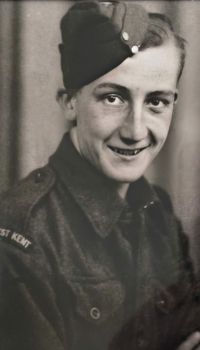
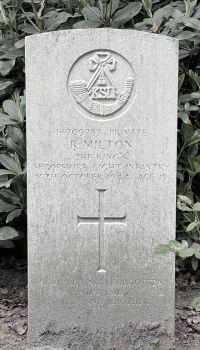
Biography
Robert Milton (service number 14709787) was killed in action on 15 October 1944 in the vicinity of Overloon. He was 19 years old and a private in the King’s Shropshire Light Infantry, 4th Battalion. He was buried in a field grave near a small farm in Holthees and reburied in 1947 at Overloon War Cemetery in grave IV.C.10. His gravestone reads: Gone but not forgotten, Father Mother Brothers and Sisters.
Family background
Robert Milton (known to his family as Bobby) was born on 24 August 1925 in Bermondsey, London. His parents were Henry Cecil Milton (1901-1963) and Jane Taylor (1901-1973).
He had two brothers, Henry (Harry) Milton (1919–2000) and Leonard Milton (1929–2023), and three sisters, Iris Milton (1934), Rose Milton (1936-2025) and Edna Milton (1932).
He attended Midway Place School in Rotherhithe, South East London.
His brother Leonard recalled that he last saw Bobby when he mistakenly went home an hour early for lunch. On his way home, he encountered Bobby, who had just left the house to go to war.
Henry (Harry) became a prisoner of war (POW) in Kalamarta, Greece. He was transferred to the notorious Stalag 306 prisoner of war camp in Germany. This extremely difficult journey to the camp has often been discussed. It involved being packed into a train and forced to march long distances. Many died along the way from exhaustion. Fortunately, Henry survived.
Military career
It is not yet known when Robert Milton enlisted in the army but according to one of his sisters he firstly joined the Royal West Kent Regiment. In his first letter to his parents, dated around 1 October 1944, he writes that he has changed regiments and been transferred to the 4th Battalion of the Kings Shropshire Light Infantry.
The 4th Batallion Kings Shropshire Light Infantry
The Territorial Battalion of the Kings Shropshire Light Infantry landed in Normandy on 14 June 1944 and fought its way through France, the Netherlands and Germany until May 1945.
On 3 September, the 4 KSLI reached Ninove in Belgium, south of Antwerp. Their destination for the next day was Antwerp. About four miles outside the city, the Fife and Forfar Yeomanry, who were ahead of the 4 KSLI, reported that the outer perimeter of the forts was not in enemy hands and that the city, held by about 2,000 enemies, had been taken by surprise by the speed of the advance. The battalion therefore continued its transport to the outskirts of the city. A dense crowd, cheering and embracing ‘their liberators,’ made military operations very complicated.
Their first objective was to occupy a park in the centre of the city. As they approached the park, they encountered no resistance and the crowds turned it into a triumphal procession. However, the enemy had strong defences at the park and the leading company came under heavy machine gun fire. After desperate hand-to-hand fighting, the enemy surrendered. A company was then sent to clear the mayor’s house. The garrison there held out until dark, when they finally surrendered. During the night, one company was sent to hold one of the bridges on the northern edge of the city.
The War Diary reports that all operations were carried out with the greatest effort due to the enthusiasm of the citizens, who literally carried entire platoons and companies on their shoulders. The battalion headquarters was established in the park behind the German barbed wire, and the guards were mainly concerned with keeping out the cheering population.
The four KSLI remained in and around Antwerp until 8 September, when they moved to Leuven, Heusden and then to Hecteren, which they reached on 11 September and where they remained until 21 September. By that time, they had taken on men from various regiments and it was said that they were becoming a mixed bunch. While they were here on 15 September, they heard about a planned major advance to Arnhem, and on 17 September they saw many fighter planes and heavy bombers flying overhead in support of the largest airborne operation ever. This would be the advance to Arnhem in Operation Market Garden.
On 18 September, they travelled to Bree and took part in a deception plan to conceal a bridge operation over the Escault Canal. On 20 September, they crossed this canal at Lille St Hubert and entered the Netherlands. They spent the night in Budel. The diary mentions that “everyone seemed very happy to see us and they waved orange flags with great enthusiasm”. On 21 September, they moved on to Vaarsel, where they waited for the Herefords to build a bridge over the Willemskanaal. The next day, they captured Asten with the Fife and Forfars. On 25 September, they moved on to Gemert, where they received an excellent welcome, and then to Sint Anthonis. The next day, they heard that the bridgehead at Arnhem had been evacuated. They remained in Sint Anthonis until 29 September, defending the village and patrolling the surrounding area, including Boxmeer.
Letters home from Robert
The family receives his first letter in early October, undated, followed by several more a few days later:
Dear Mum
Just a quick note to let you know that I am well and that this is the first opportunity I have had to write. We have been here for ten days now and I have travelled through France and Belgium. As you can see, I have been transferred to another regiment, which suits me fine. I hope everything is well at home and that Edna, Iris and Rose are also well. I also hope you’ve heard from Harry. Don’t worry about me, because I’m fine and there’s no danger here. I hope Dad and Lennie are working and that everything is going well for you. I can’t think of much else to say right now.
See you soon, all the best, your loving son Bob xxxxxxxxxx
Harry was a brother who was a prisoner of war at the time.
Dear Mum
Just a line hoping you are all still ok as it leaves me at present. Well mum I am quite alright here and I hope you are the same, and I hope you have heard from Harry recently. Well mum I don’t suppose you get any doodle bug now at least, I hope you don’t mind anyway. Well mum I expect by the time you get this letter it will be near Edna’s birthday.Well mum I hope pop is at work and also Lennie, and I notice Millwall are at the bottom of the league thats because I am not there I expect. Well mum I can’t think of anything to say just now, but remember me to everyone at home. So I guess I will have to close now.
So cheerio, all the best, your loving son Bob xxxxxxxxxxxxx
Edna is his sister, Lennie a brother Millwall – local football team.
Dear Mum
Just a line hoping you are still ok as it leaves me at present. Well mum I am quite ok here and in the best of health and I hope you are all the same at home. Well mum I hope the three girls are ok and I hear the doodle bugs still drop on England. I hope you are not getting any round your way. And I hope you have heard from Harry, but anyway I dont think it will be long before we are all united all at home again. Well Mum I hope pop is still working and that his chest is ok and that Lennie and yourself are in good health, and does nan and uncle Ern still live opposite I hope they are all ok also, and Nan in 35 as well. Well mum its quite a job of thinking what to write about but I reckon you don’t mind as long as it’s a line or two. Well Mum i’m stuck for words now so I will have to close.
So Cheerio, all the best
Your loving son
Bob xxxxxxxxxxx
Harry – brother POW
The mood was positive, thinking about all being home together soon
Dear Mum
Just a line to say I am well and happy hoping you are all the same at home. Well Mum its raining cats and dogs here so all we are doing is sitting in our little hut round the fire smoking and reading and living like lords. Well Mum I hope Edna, Iris and Rose are well also Lennie, Pop and yourself, and I hope once again you have heard from Harry.Well Mum this is not a bad country it’s summer here when it doesn’t rain, and plenty of beer not as good as London’s beer but not bad, so as you can see i’m not so bad considering I am in a foreign country, well Mum once again I am stuck for words and the boys are hurrying me up to go out. So I will have to close.
So cheerio
All the best
Your loving son
Bobxxxxxxx
P.s. Just received a letter from you
Edna, Iris Rose, his sisters
Harry – POW brother
Lennie – brother
Raining cats and dogs – is a Londoner slang term for it’s raining very heavy
Dear Pop
Just a line in answer to your letters I received yesterday and am glad to hear you are all ok as it leaves me at present. Well Pop how are you doing over the dogs are you winning (or what) and I noticed Millwall made a bad start this year but perhaps they will do better later on (I hope) Well Pop how’s your old windbags, mines alright at present except when it rains but not to bad. Well Pop I heard a little joke here it’s not good but something to fill the page up.
One bloke (to another) – my brother died with music on the brain.
Second bloke – Hoes that
One Bloke – Why a piano fell on his head
Well anyway Pop so that’s is that and I can’t think of a lot to say just now so I will have to close so remember me to all at home.
So cheerio
All the best, Your loving son
Bobxxxxxxx
P.s. rum – have this one on me.
Pop is father
Windbags – Cockney for lungs
Rum meaning drink
Dear Mum, Dad
Just a line hoping you are still all ok as it leaves me at present. Well Mum I am still quite happy here and in good health. Well Mum I hope the three girls are well and I will look forward to a letter from Edna, I can’t write to her yet as I forgot the address. Well Mum I hope you have heard from Harry again by now and I expect you will soon be seeing him the way the war is going, I hope pop is working and that his chest is ok and the terror getting on (Lennie) I hope he’s ok and earning all the money. Well Mum as you can see there is not a lot of room left so I reckon I will have to close. Wishing you all the best.
So cheerio, all the best, your loving son Bob xxxxxxxxxxxxxxxx
Bobs last letter, he was killed the next day 15th October 1944
Edna – sister, must be evacuated / living in another place (safer than London)
Terror – lovable term referring to his brother Lennie
Overloon and the attack on Smakt
They were relieved of their duties in Sint Anthonis by American troops, allowing them to return to a rest area in Gemert, where they remained until 7 October. They had the pleasure of enjoying bathing and entertainment facilities there. On 7 October, they went to the area around Mullem to take over defensive positions from the US 7th Armoured Division.
The Peel region was a difficult area for warfare, which benefited the German defence. The regiment witnessed the failed attempt by the American 7th Armoured Division at close quarters and knew that they would soon need to make an attempt to cross the Meuse and enter German territory. When the 4th KSLI battalion is added to the 3rd Infantry Division, the time has indeed come for the British: 12 October, the Battle of Overloon.
On 15 October, the battalion was ordered to launch an attack from an area occupied by the 2 KSLI, targeting the village of Smakt, with the boundary of the operation being the railway line running north-south, a few hundred metres west of Smakt. They passed Overloon with some effort because heavy traffic had left the roads and paths in very poor condition. Overloon had only been captured the day before.
The attack included assistance from the Fife and Forfar Yeomanry and a rolling barrage of artillery that would move every 2 minutes at a speed of 100 metres. The barrage needed to remain at the opening line for 10 minutes. Unfortunately, some guns fired too short and fell into the KSLI’s area, causing some casualties.
The attack was difficult, chaotic and messy, because the troops not only had to attack the enemy, but also had to protect their own comrades who were in the front line. Providing cover was therefore risky: every shot fired at the enemy could also hit their own men, which made the battle even more tense and confusing.
The barrage eventually continued, but the momentum of the attack was halted until the attacking guns stopped firing. The attack continued and the barrage was called off, replaced by the firing of explosive charges. The ground over which the battalion was moving was a large sandy plain, marked by sand dunes – impassable for all vehicles except tanks and carriers (with effort). The commander’s reconnaissance vehicle was towed all the way by the tank of the regimental commander of Fife and Forfar to maintain communication with the rear radio link. Several companies encountered some resistance but reached the railway line.
When the battalion had taken up its position, the enemy began shelling the area and bombarding it with mortars, with the companies on the right being hit hard by 105 mm, 88 mm mortars and Nebelwerfer rockets. A considerable number of aerial bombs were also dropped. The attack that day cost the battalion 4 dead and 29 wounded.
It was on this day that Robert Milton was killed. He was hit by shrapnel after a patrol. His comrades and Major Urwin Thornburn laid him to rest in a quiet corner at Loonseweg 8 in the small village of Holthees, where the battle had taken place, and held a funeral service at the grave.
On 3 June 1947, Bobby was reburied in grave IV.E.10 at Overloon War Cemetery.
During the attack on 15 and 16 October 1944, several of Bobby’s comrades were killed. Also buried at Overloon War Cemetery are:
Pte Frederick Harrington, Pte Ronald Keel, Pte Bernard Oakley, L/Cpl Patrick Sweeney.
On Mierlo War Cemetery: Pte Savage A. and Pte Scott S.W.
On Venray War Cemetery Pte Neary A.
Pte Chilton W. is still missing (MIA)
In early November, the family receives a letter of condolence from Major Urwin Thornburn:
Majoor Urwin Thornburn – 4/K.S.L.I
28 October 1944
Dear Mrs Milton
It is with the most sincere sympathy that I write to tell you that your son was killed in action on 15th October. He was returning from a patrol and had just reached our lines when he was hit by a shell fragment. He must have died instantaneously and we may be thankful that he can have suffered no pain.
It is difficult for me to say anything which can give you consolation at such a time. The price is indeed high which we have to pay to make this world a place fit for our loved ones to live in.
I feel that in your sons case we should ask god to give you the faith to believe that only those who are truly worthy are called by him to make the supreme sacrifice. May we be as worthy as your son when our time comes.
I was very sorry to lose your son, as he had been with me for such a short time, and I was only just beginning to get to know him.
We laid him down to rest in a quiet corner of the little village where the action was fought and held a funeral service at the graveside. I think it was as he would have wished it himself.
May renew my sympathy for you at this sad time. God be with you at the sad time, God be with you.
I remain yours most sincerely
Urwin Thornburn Major 4/K.S.L.I
Sgt George Harold Eardley
It is also worth mentioning in this biography that Sgt George Harold Eardley, a comrade from A Company, was later awarded the Victoria Cross for his actions on that day. Sergeant Eardley took out three machine gun nests under heavy fire, enabling the platoon to continue the attack and ultimately reach its objective after heavy fighting and suffering heavy losses.
Photo’s and documents
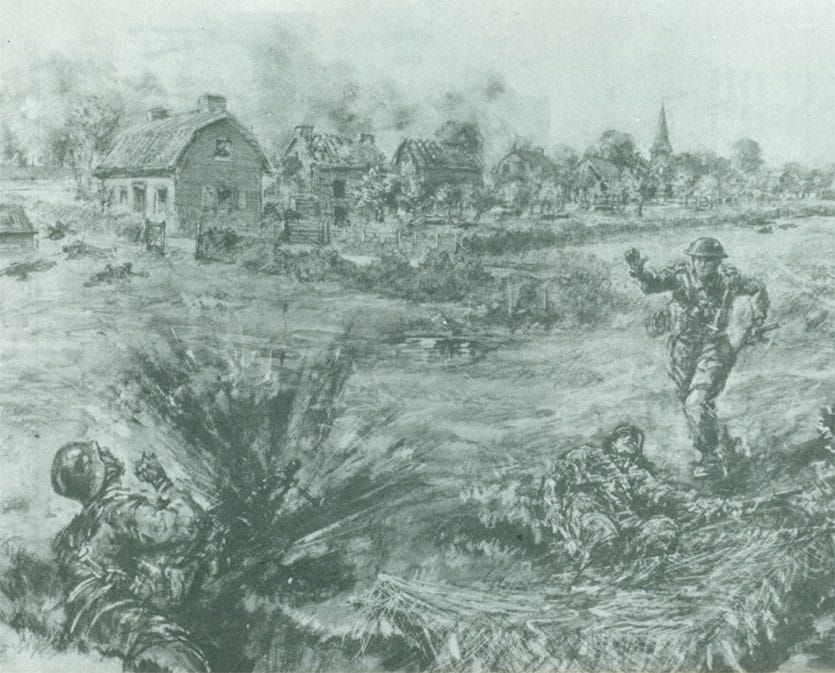
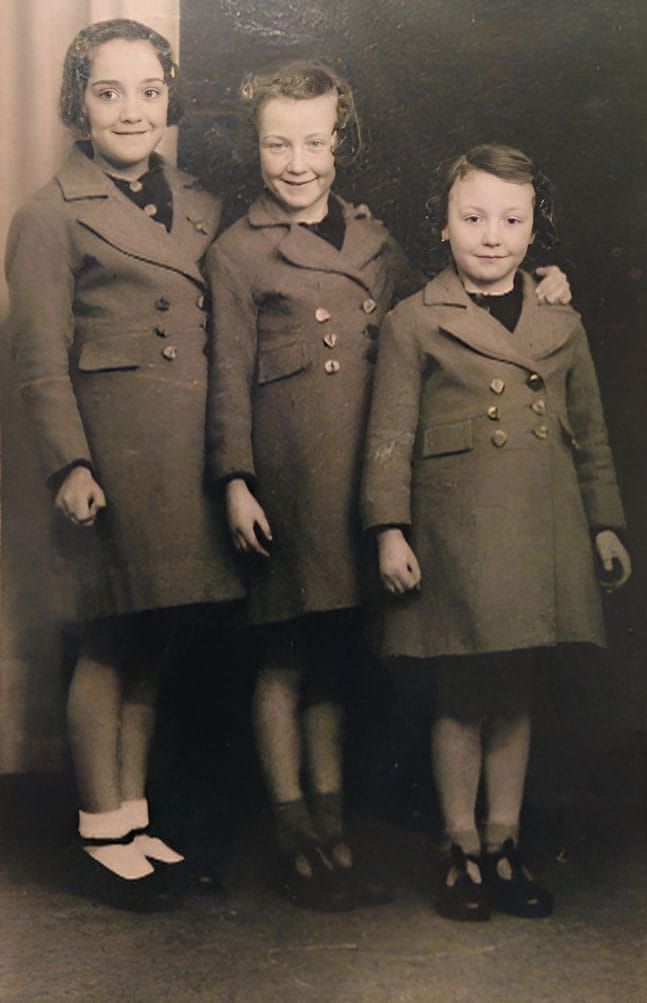
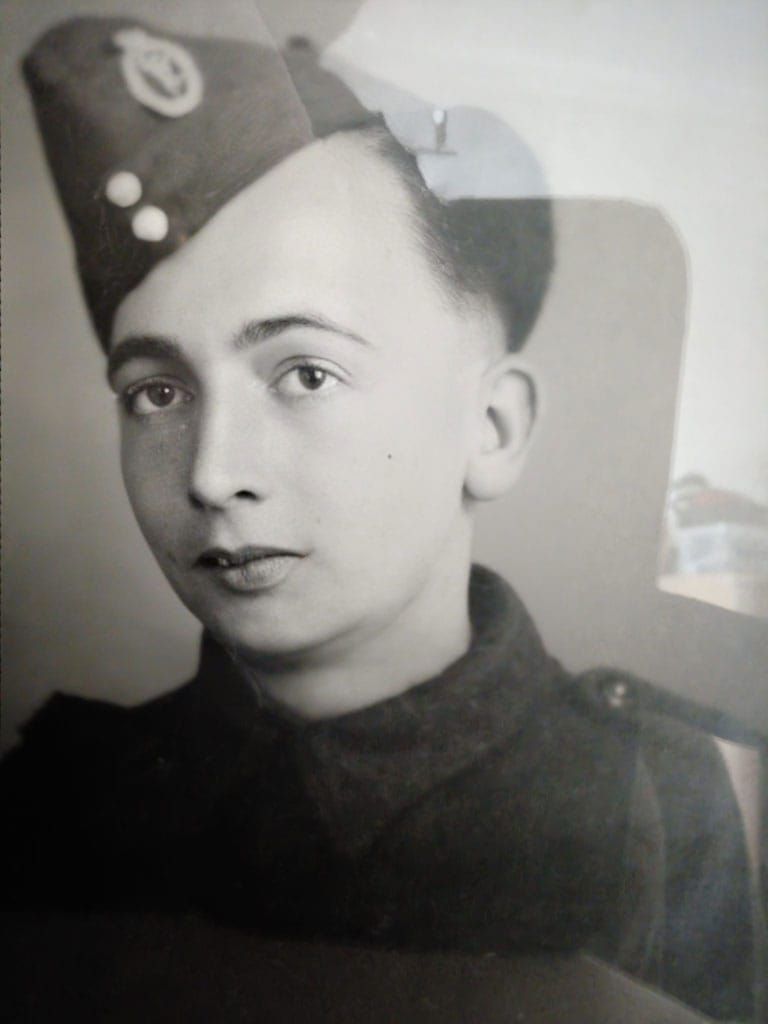
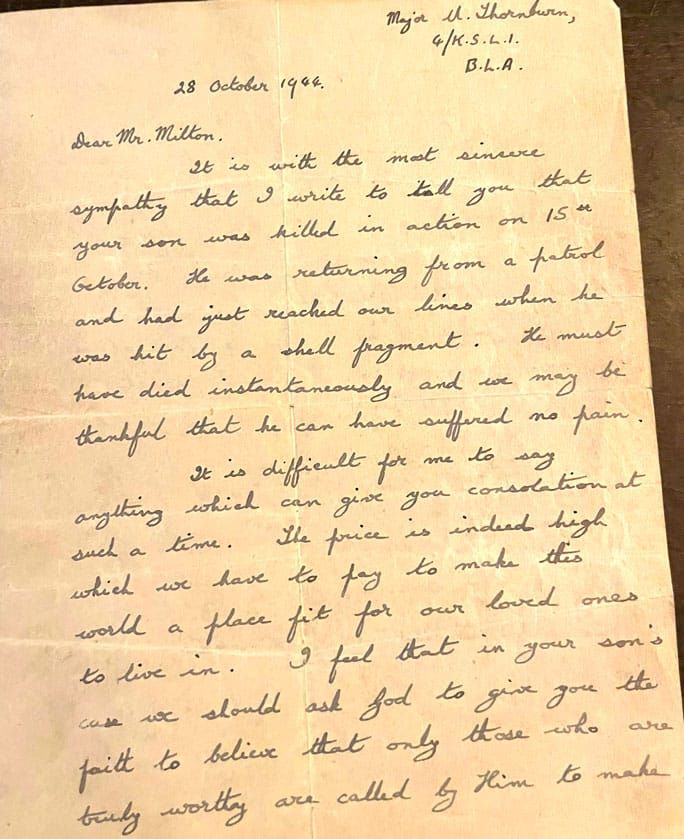
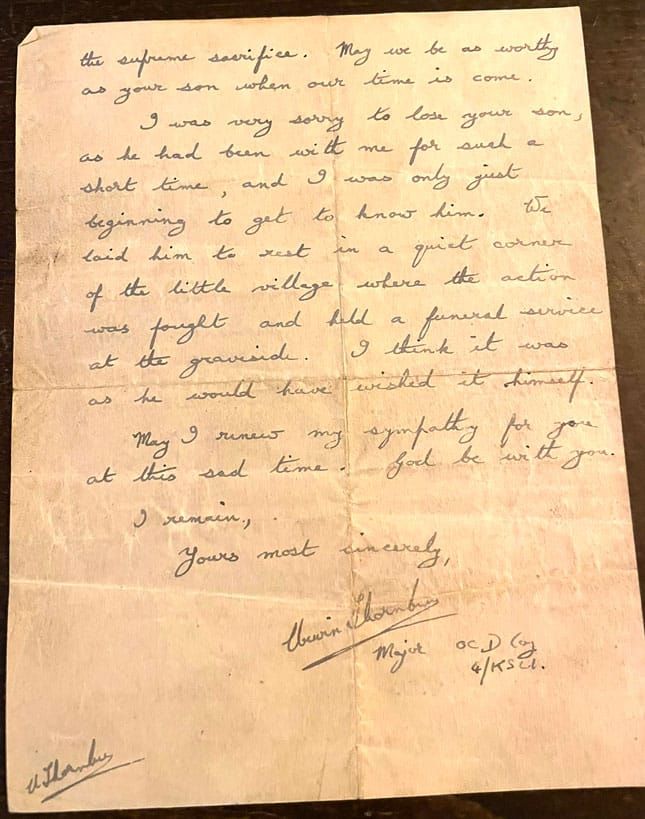
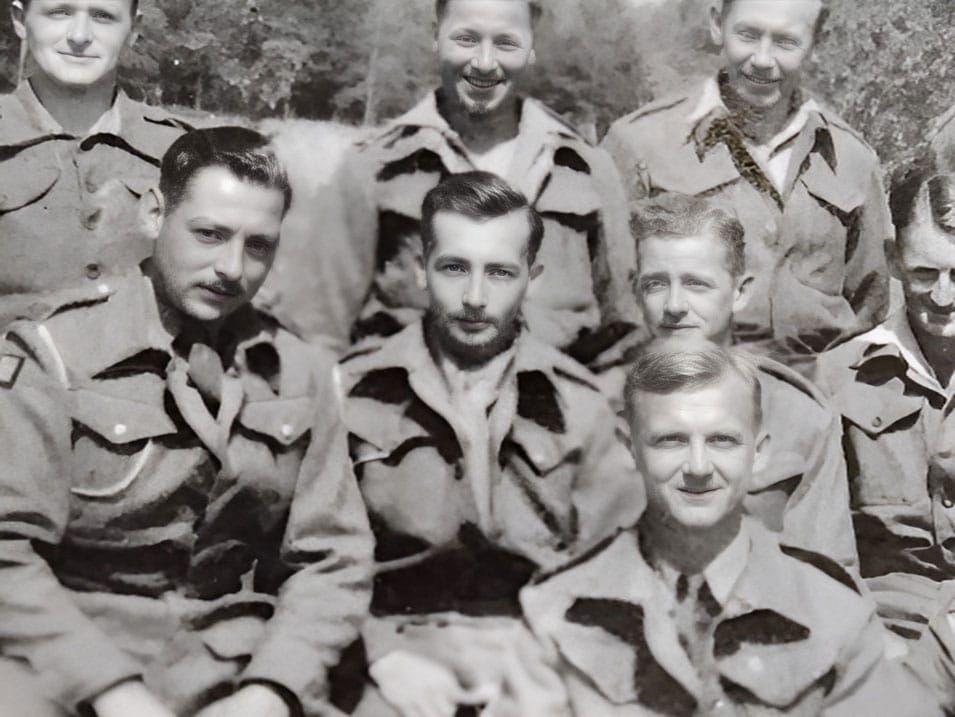
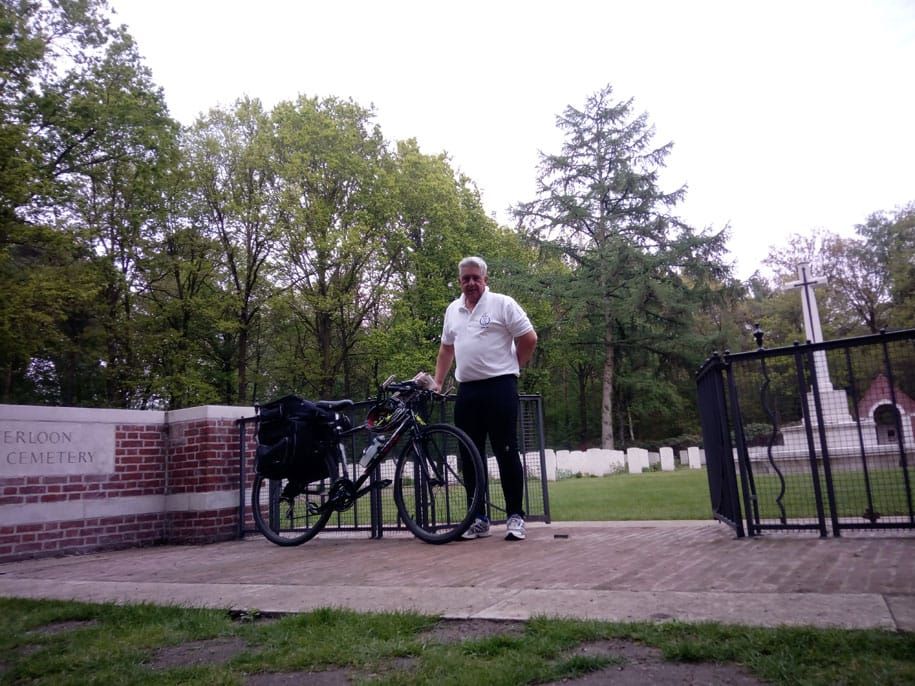
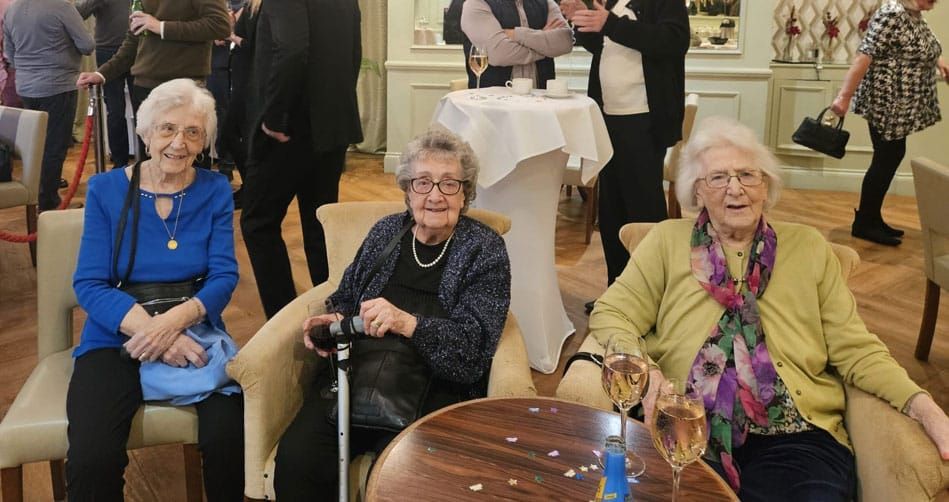
Family visit October 2025
During the weekend of 3-5 October a large group of Bobby Milton’s cousins and nieces visited Overloon. We organized a battlefield tour for them in the Overloon area and took them to the fields in Het Schaartven where Bobby was killed and where he was temporarily buried in a field grave. We also attended an emotional and very beautiful memorial ceremony where the family commemorated their uncle Bobby with beautiful words and music and thanked him for what he meant to freedom but also to his family.
For us as a Foundation, it was yet another confirmation of how important our work is in finding families, telling their stories, and bringing them together at the graves of the military at the war cemetery in Overloon.
Sources and credits
Ancestry family trees and other information sources
Wikipedia: King’s Own Shropshire Light Infantry
King’s Own Shropshire Light Infantry War Diary from website Traces of War
After Antwerp – Major Ned Thornburn
Information and photo’s Ken Milton, nephew of Bobby Milton
This biography has been compiled by our foundation based on our own research and stories from other soldiers who served in the same regiment or participated in the same battle. Part of the collective work within the foundation has been used for this purpose.
Research Anny Huberts





